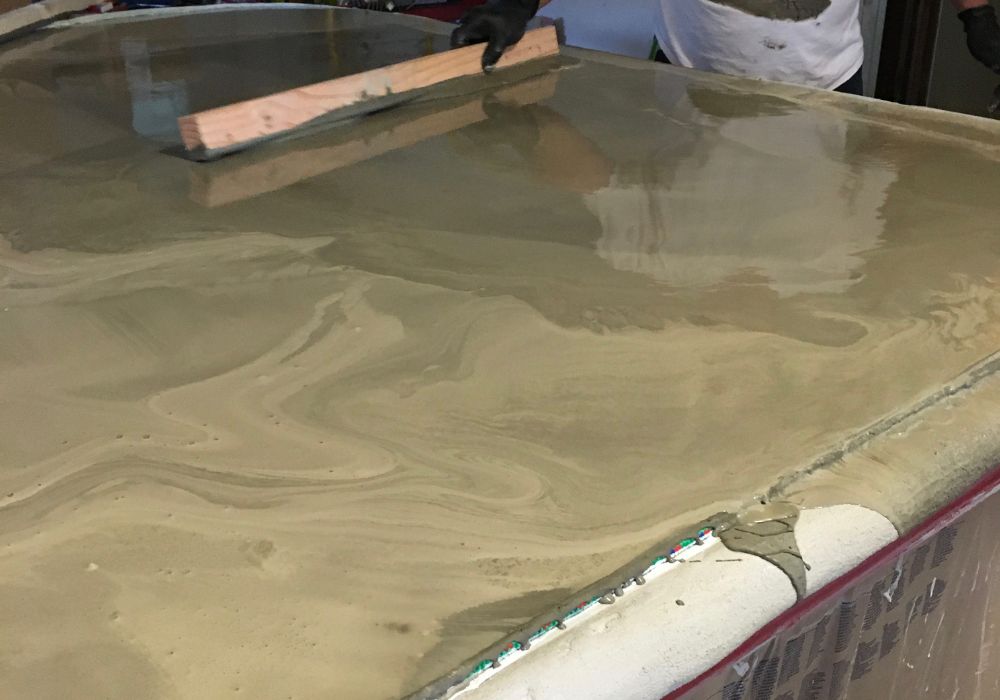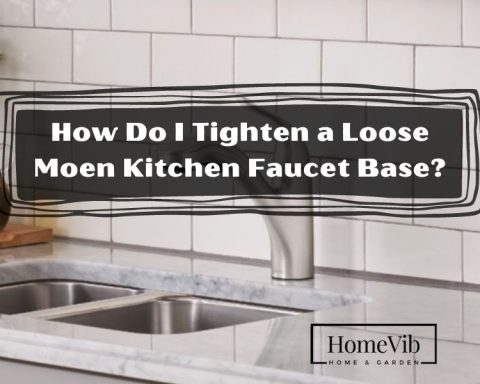Countertops are functional inside the kitchen since they provide space for preparing food. Furthermore, they have sinks and cooktops necessary for daily cooking.
Because of the convenience they bring, various types of countertops are now available. One of them is concrete. But is buying concrete countertops a good idea?
A concrete countertop is a good idea because of its durability. With proper care, the countertop can last for years. Aside from that, there are limitless designs that you can choose from. The shape and color of a concrete countertop can also be customized.
Are Concrete Countertops Good And Still In Style?
The composition of the concrete countertop makes it durable to last for a lifetime if sealed. It is also sturdier than laminate and solid surfaces; hence, it can resist scratches.
Concrete is an excellent choice if you want a customized countertop! You can select the exact color, sheen, and edge profile you prefer.
A concrete countertop can offer a unique vibe when it comes to style. You can make your kitchen look traditional or modern with various designs.
The right combinations of color can provide you with a vibrant kitchen or a luxurious space. Concrete countertops combine perfectly with kitchen cabinets, bringing an industrial edge.
Suppose you want to help the environment while having a beautifully-designed kitchen. In that case, you can combine concrete countertops with recycled glass.
A retro-industrial vibe is also possible by mixing the countertops with subway tiles. Due to the designs offered by concrete countertops, your kitchen can stay in style.
What Are The Advantages Of Concrete Countertops?
Durability
As a countertop made of a cement-and-sand mix, the concrete countertop is formidable. It can also last for decades with proper waxing and sealing.
You don’t need to replace it occasionally unless you want a total kitchen renovation. Some contractors also add glass fibers to make the concrete less prone to cracks.
Since it is harder than laminate and solid surfaces, it can resist scratches better. The countertop can withstand the cooktop’s heat as long as it is properly sealed.
Due to its durability, it is perfect for busy kitchens and active families who love to cook.
Versatility
One of the benefits of a concrete countertop is its versatility. It can be formed and shaped according to the needs of your kitchen. Similar to ceramic tiles, it offers a wide variety of choices.
You can also choose the texture, size, and color preferred for your kitchen. Because of options, many homeowners can be more creative.
Furthermore, different items can be embedded to add variations. Contractors include small items such as shells, glass fragments, stones, and fiber-optic lights.
Hence, it provides a down-to-earth style uncommon for laminate and stainless steel.
Since you can use repurposed materials, choosing concrete countertops is eco-friendly. Another benefit of selecting concrete is that it can fit even in the narrowest kitchens.
Sinks, fire pits, and basins can also be molded to work seamlessly on the countertop.
Increase The Home’s Value.
A concrete countertop can add resale value to your home. Because of the customization, homeowners consider concrete among the high-end kitchen countertops.
Concrete countertops also become status symbols, similar to granite and other high-end countertops.
Potential buyers are also looking for a uniqueness that the countertop can provide. It is one of the reasons why it adds value to one’s home.
Moreover, it can adapt to any kind of design, including modern and traditional ones. You can also combine it with other materials to create your desired and preferred look.
What Are The Disadvantages Of Concrete Countertops?
Costly
Compared to other kitchen countertops, concrete is more expensive. Its average price may range between $65 to $135 per square foot. But the installation may cost you about $40 to $50 per hour.
Since curing the countertop may take 28 days, expect to spend more on labor. Furthermore, it is the price for a basic design. Hence, you have to add more if you want a customized countertop.
Requires Maintenance
As a porous surface, a concrete countertop is prone to staining. Unfortunately, porous countertops can easily absorb stains. Hence, they are more prone to bacterial growth.
Sealing the countertop annually is needed to protect it against stains and heat.
If you have a concrete countertop, it is necessary to maintain it regularly to last longer. You also must conduct a routine waxing and polishing to keep its surface in good condition.
To prevent stains, you must wipe the spillage as quickly as possible. Water may even leave the countertop blotched, especially if properly sealed.
Laborious Installation

Before you select a concrete countertop, please take note of its laborious installation. It is not only costly, but it also takes a lot of time to finish.
You can also install the concrete countertop by yourself. However, it is lengthy since curing the concrete takes 28 days before installing it. Precise measurements are also necessary.
Furthermore, concrete countertops are challenging to install because of their heaviness. They weigh about 19 to 25 pounds per square foot.
You need additional support to help you in moving the concrete. They need to use preformed slabs to hire professionals to install the countertop.
What Is The Best Concrete To Use For Countertops?
The best concrete for countertops is a Quikrete Countertop Mix. Its components are specifically designed for countertops.
It has a super-plasticizer that helps avoid air bubbles, shrinking, and cracking. The countertop mix is also easy to shape and form according to your desired design.
Because it is a high-strength mix, you can polish it without worrying it will crack. Using a countertop top mix prevents a blemished finish. It is because the mixture flows flawlessly to the corners and the edges.
Unlike regular concrete, the mix can be stripped from the form after 18 hours. It also has a high PSI or compressive strength, making the countertop durable.
Can You Use Regular Concrete Mix For Countertops?
In choosing concrete, it is vital to consider the PSI. For countertops, the concrete mix must have at least 6,000 PSI. Unfortunately, a regular concrete mix can only reach 4,000 PSI at the complete cure.
A concrete mixture with higher PSI is more durable and less prone to cracking. You must also select a concrete mix that does not cure too slowly or too fast.
Concrete Countertop Costs
Are Concrete Countertops Worth It?
Concrete countertops have a long life service as long as they are sealed and maintained. They are available in various designs and can be customized according to your desire.
They are considered high-end kitchen countertops because of their designs and exclusivity.
Besides the wide variety of choices, concrete countertops can add value to one’s home. If you plan to resell your house, you should not hesitate to invest in concrete countertops.
Many potential buyers want to enjoy the exclusivity, durability, and customization countertops offer.
What Is the Average Cost For Concrete Countertops?
The average cost of a basic concrete countertop is between $65 to $135 per square foot. For a concrete countertop with seeded aggregates, you must spend at least $100 to $135 per square foot.
Meanwhile, concrete countertops with high-end designs are more than $135 per square foot. In terms of installation, a medium-sized kitchen is about $1,000.
Are Concrete Countertops Cheaper Than Granite?
When it comes to cost, granite is cheaper compared to concrete countertops. The average price of a granite countertop is about $40 to $60 per square foot.
However, those rare in colors and stones may range between $75 to $100. Installing a concrete countertop is more laborious. Thus, you will need to spend more on its installation than the granite countertop.
How Much Do DIY Concrete Countertops Cost?
If you hire pros to install a concrete countertop in a 30-square-foot kitchen, you must spend at least $2,550 to $5,250. But it will only cost about $240 to $450 for every 30 square feet if you will do it yourself.
A DIY concrete countertop can help you save thousands of dollars! There are also tutorials available online to help you install the countertop correctly.
What Is The Best Sealer For Concrete Countertops?
A concrete countertop has a porous surface. So, sealing is necessary to prevent bacterial growth and improve its durability. The best sealer must be effective in resisting heat, stains, and scratches.
It must also make the countertop easy to clean and maintain. Most important of all, it must be food safe.
One of the best sealers for concrete countertops is Polyaspartic 745. The high gloss finish that it provides is aesthetically appealing.
Polyaspartic 745 Countertop Sealer
Moreover, it is food safe and can resist stains caused by wines and lemons. A concrete countertop treated with this sealer can also last more than ten years.
Can You DIY Concrete Countertops?
For those who want to save money, DIY concrete countertops are available. There are available tutorials online that can help you.
Besides, some concrete countertops can provide you with step-by-step instructions. It may be challenging if you are a beginner, but it is also rewarding. The key to building concrete countertops is planning ahead of time.
You must get the proper measurements so the concrete countertop will fit in the kitchen. The first step is to build the mold.
To know the countertop’s size, measure the cabinet’s base where the countertop will be put. The mold is where you will pour out the concrete mix into.
Next, make a cutout for the sink or cooktop, then determine if it fits on the countertop. You can also conduct a dry fit. Once you are done, build the support and the prep wire.
The concrete is about 10 to 15 pounds per square foot. So, you have to provide extra support to prevent the edges of the mold from bending.
To proceed, mix and pour out the concrete. Check the manufacturer’s instructions to know how much water and concrete you need to mix.
Don’t forget to put pigment additives if you want to add colors to the countertops. Let the concrete cure for at least one week.
After curing the concrete, please remove it from the mold and finish the slab. Using a sponge or brush, you must also etch the surface and apply a concrete sealer.
The last step is installing the countertop. Apply a thick bead of silicon around the top part of the cabinet for a steady countertop.
How Thick Do Concrete Countertops Need To Be?
If you wonder how thick a concrete countertop must be, it should be at least 1 ½ to 2 inches. It is the similar thickness required for granite and marble.
Installing concrete countertops that are more than two inches is too heavy. But suppose you want to make the countertop thicker. In that case, it is vital to add support and ask the manufacturer about the procedure.
However, it is possible to create a heavy-looking concrete countertop. Some contractors make designs that create a huge and thick look. The front is 6 inches thick, but the back and the center are only 1.5 inches.
Frequently Asked Questions
Are Concrete Countertops Better Than Granite
When it comes to designs, concrete countertops have a lot more to offer than granite. They are perfect for homeowners who want a minimalist or contemporary-looking kitchen.
However, concrete countertops are more porous than granite. Hence, they require more maintenance.
Do Concrete Countertops Stain Easily?
Due to the porous surface of concrete countertops, they quickly absorb stains. Thus, they are more prone to bacterial growth.
It is necessary to wipe stains right away to prevent them from blotching the countertop. Sealing the countertops after installation can help solve this problem.
Are Concrete Countertops Easy To Maintain?
You need to apply sealer and wax to concrete countertops to protect them against stains. If your countertop is not sealed, you have to clean the mess right away to prevent them from blotching. The sealer must be reapplied annually.











